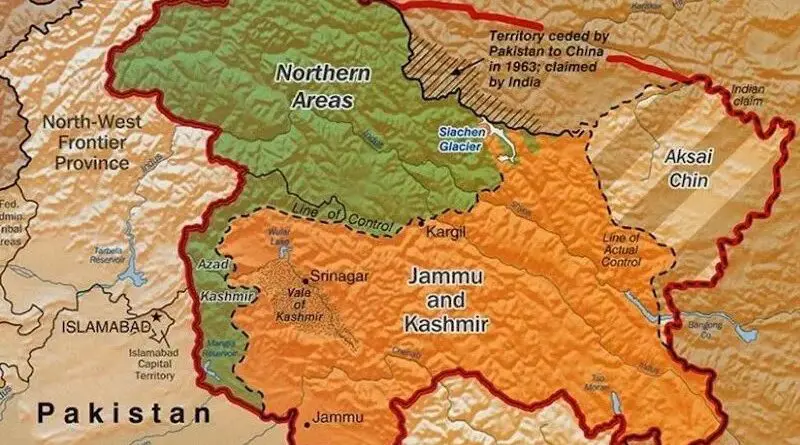Indian Defense Minister’s Lofty Claims – OpEd
In a recent development Indian Defense Minister Rajnath Singh issued a highly irresponsible, unfortunate and provocative statement. He asserted that India is ready to cross the “Line of Control (LOC)” while addressing a Kargil War memorial in Ladakh’s Drass town.
This is not the first time that Singh has made such inflammatory remarks. It marks yet another instance in a series of such declarations that have resurfaced over the years. As reported by several media outlets, the defense minister has issued gratuitous remarks threatening to divide Pakistan into pieces, annex Gilgit-Baltistan (GB), and now, once more, to cross the LOC. This pattern of rhetoric provides insight into the BJP’s expansionist mindset, extremist ideology, hegemonic ambitions, and obsession with Pakistan. In addition to that, these remarks exhibit a concerning level of delusion and a pronounced hostility towards Pakistan. Moreover, such statements seem to be rooted more in falsehood and fantasies rather than a realistic assessment of the complex geopolitical landscape.
Pakistan responded strongly to India’s provocative remarks through a press release issued by its Foreign Ministry. It condemned India’s defense minister for “boasting about readiness to cross the LOC”, advising India to exercise utmost caution. Such belligerent rhetoric was deemed a threat to regional peace and stability, contributing to a destabilized strategic environment in South Asia. Moreover, it’s worth noting that this is not the first instance of India’s political leaders and military officers making irresponsible statements about Azad Jammu and Kashmir (AJK) and Gilgit-Baltistan (GB). Indian army’s Lieutenant General Upendra Dwivedi issued a similar provoking and unwise statement back in Nov, 2022 that “Indian army is ready to execute orders” to take portion of Kashmir under Pakistan’s administration. In response, Pakistan’s military’s media wing, slammed the statement and termed it delusional, lofty claims & surreal ambition, and intellectually insulting. Furthermore, Pakistan counseled India that such Jingoistic statements must stop immediately. At the same time, Indian leadership was reminded that Pakistan is fully capable of defending and thwarting any aggressive plans.
A similar pattern of statements emerged following the Pulwama attack in Indian Illegally Occupied Jammu and Kashmir (IIOJK). Occurring just before elections in India, the attack was exploited as a political tool to garner support and sway public sentiment. Moreover, irresponsible rhetoric and baseless accusations were employed against Pakistan. Despite the absence of any concrete evidence, India hastily attributed the attack to Pakistan sparking a surge in war hysteria and pressure within the country to retaliate. As a result, on February 26, 2019, India under Modi’s leadership conducted airstrike on Balakot on a so-called militant training camp. Pakistan strongly condemned the Indian airstrike on Balakot and categorically denied the presence of any militant training camp. In response, Pakistan launched operation “Swift Retort” and during the intense aerial engagement, two Indian planes were shot down. To add to India’s embarrassment, Pakistan captured the pilot of one of the downed planes, (Wing Commander Abhinandan). Pakistan as a gesture of peace and to de-escalate matters handed him back to India two days after he was captured. The events that unfolded on that day left a lasting impact, challenging the notion of Indian military superiority. Moreover, this decisive response stood as a testament to Pakistan’s resolve in defending its territorial integrity and thwarting any aggressive actions against its sovereignty.
Furthermore, Rajnath Singh’s remarks seem to be strategically aligned with certain political objectives and challenges faced by the ruling BJP government. It is pertinent to note that upcoming elections are scheduled between April and May 2024, the BJP has historically benefited from anti-Pakistan rhetoric, as seen after the Pulwama attack and Balakot airstrike. The timing of the provocative remarks suggests a calculated move to capitalize on nationalist sentiments and consolidate public support. Moreover, the formation of the Indian National Developmental Inclusive Alliance (INDIA) as an attempt by the opposition parties to challenge the BJP has intensified the political pressure on Modi. Apart from that, Modi is facing internal challenges in Manipur, where ethnic violence between the majority Meitei and Minority Kuki has claimed numerous lives. A shocking and disturbing video also emerged of an attack when two Kuki women were paraded naked by Meitei men after their village was razed. The BJP government led by Modi may be resorting to such aggressive statements to divert attention from these pressing issues. In light of these complexities, the defense minister’s statement appears to serve as a strategic maneuver to reshape the narrative and garner support during a crucial election period.
As of the current moment, the prospects for meaningful dialogue between India & Pakistan appear uncertain. The bilateral relations have been strained for quite some time, especially following India’s revocation of Kashmir’s special status and the subsequent downgrading of diplomatic ties by Pakistan. Moreover, the political dynamics within India, including upcoming elections and the BJP’s historical use of anti-Pakistan rhetoric for electoral gains, may also play a role in shaping the country’s engagement with Pakistan.
Additionally, the US side rendered India the leading partner role to tame China; it might further solidify its current stance on avoiding dialogue with Pakistan. Given the complexities and challenges mentioned, achieving substantial progress towards peace in the region remains speculative at this juncture. Looking forward, while the road to reconciliation may appear challenging at the current moment, sincere intentions, sustained efforts, and genuine commitment to peace can overcome obstacles.

